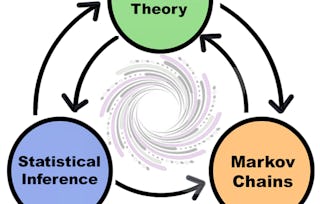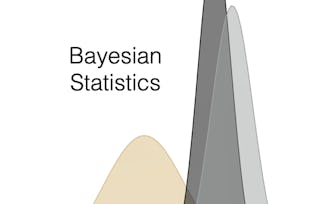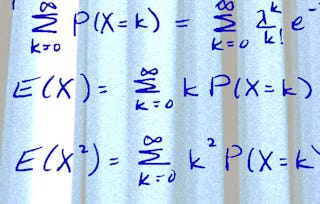Understand the foundations of probability and its relationship to statistics and data science. We’ll learn what it means to calculate a probability, independent and dependent outcomes, and conditional events. We’ll study discrete and continuous random variables and see how this fits with data collection. We’ll end the course with Gaussian (normal) random variables and the Central Limit Theorem and understand its fundamental importance for all of statistics and data science.

Probability Foundations for Data Science and AI
Seize the savings! Get 40% off 3 months of Coursera Plus and full access to thousands of courses.

Probability Foundations for Data Science and AI
This course is part of multiple programs.


Instructors: Anne Dougherty
37,877 already enrolled
Included with
280 reviews
Recommended experience
What you'll learn
Explain why probability is important to statistics and data science.
See the relationship between conditional and independent events in a statistical experiment.
Calculate the expectation and variance of several random variables and develop some intuition.
Details to know

Add to your LinkedIn profile
7 assignments
See how employees at top companies are mastering in-demand skills

Build your subject-matter expertise
- Learn new concepts from industry experts
- Gain a foundational understanding of a subject or tool
- Develop job-relevant skills with hands-on projects
- Earn a shareable career certificate

There are 6 modules in this course
Earn a career certificate
Add this credential to your LinkedIn profile, resume, or CV. Share it on social media and in your performance review.
Build toward a degree
This course is part of the following degree program(s) offered by University of Colorado Boulder. If you are admitted and enroll, your completed coursework may count toward your degree learning and your progress can transfer with you.¹
Instructors


Offered by
Explore more from Probability and Statistics
 Status: Free Trial
Status: Free TrialUniversity of Colorado Boulder
 Status: Free Trial
Status: Free TrialJohns Hopkins University

University of Colorado Boulder
 Status: Free Trial
Status: Free TrialUniversity of Colorado Boulder
Why people choose Coursera for their career

Felipe M.

Jennifer J.

Larry W.

Chaitanya A.
Learner reviews
- 5 stars
77.85%
- 4 stars
10.35%
- 3 stars
3.21%
- 2 stars
1.78%
- 1 star
6.78%
Showing 3 of 280
Reviewed on Jun 2, 2024
Thank you to everyone who put a lot of effort into making this course; it is really helpful.
Reviewed on Oct 10, 2021
The instructor is very good, more examples need to be added, there are mistakes in the evaluation
Reviewed on Oct 18, 2024
Thanks for this course to provide crucial information about Probabilities!

Open new doors with Coursera Plus
Unlimited access to 10,000+ world-class courses, hands-on projects, and job-ready certificate programs - all included in your subscription
Advance your career with an online degree
Earn a degree from world-class universities - 100% online
Join over 3,400 global companies that choose Coursera for Business
Upskill your employees to excel in the digital economy

